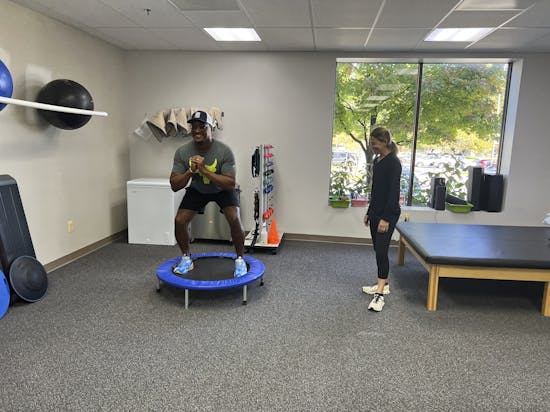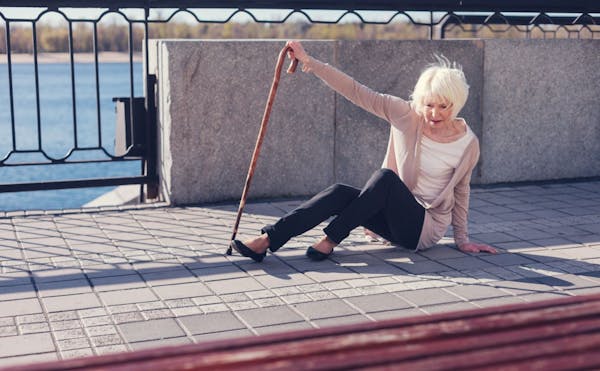-
Fall Prevention
Don’t let a fear of falling keep you from being active.
The good news is that there are clinically proven ways to prevent most falls and we can help.
A collaborative effort between your doctor and our physical therapy team can make a difference.
It Starts with a Thorough Evaluation
Physical therapy starts with a thorough evaluation of your health & fall risk factors. We will then set up on a personalized prevention program to address the findings we identify during your initial visit.
Evaluation and Treatment May Involve One or More of the Following:
- Strength testing
- Flexibility testing
- Walking (gait) patterns
- Your health history
- Sight and hearing screenings
- Blood pressure
- Assistive/adaptive device use & education
- Footwear recommendations
- Review of your medications & side effects along with your physician
- Strength training
- Balance training
- Flexibility exercises
- Visual exercises
- Functional exercises
- Weight-bearing exercises
- Sleep hygiene
- Risk reduction/modification education
- A personalized home program
Everyone is different so treatment programs will vary. The best thing you can do is contact our office and schedule an initial evaluation for balance treatment & our fall prevention program. In most cases, insurance will cover it.
Call Us Today For More Information.
-
Balance Training

You've been diagnosed with a balance disorder and your doctor prescribed balance training to help you regain your balance and improve your quality of life. So, what is balance training, and how will it help me?
Balance training is an exercise program designed specifically for you to strengthen your legs, core and other muscles that...
- Improve standing balance and locomotor performance
- Improve stability and posture
- Help with fall prevention
What kinds of exercises will I be doing?
Your physical therapist will design an exercise program that is individualized to your needs and condition. Most will include slow, methodical movements that will strengthen your muscles and improve your balance.
These exercises may include:
- Standing on one leg for a few seconds, then standing on just the other leg for a few seconds.
- Standing on one leg and raising the other one to the side or behind you then repeating this on the other leg.
- Doing heel-to-toe walking as though you're on a tightrope.
- Walking sideways using controlled movements.
- Doing alternating knee lifts as you walk.
- Doing foot circles in a seated position to strengthen the ankles.
- Standing up from a chair and sitting back down without using your hands.
- Doing Tai Chi or Yoga.
- Doing chair Yoga.
- Doing resistance band exercises such as arm curls, knees in and out, ankle pumps and hip extension.
- Bosu ball and wobble board exercises that challenge your balance.
Who benefits from balance training?
- Older adults with age-related balance disorders
- People with such neuromuscular conditions as multiple sclerosis (MS), Parkinson's disease, stroke, Amyotrophic lateral sclerosis (ALS) - Lou Gehrig’s disease
- People undergoing cancer rehabilitation
- Obese people
Practice makes perfect
Practice the balance activities you learn in therapy when you're at home. This will help further strengthen your muscles and the nerves that control them. It's easy to do the leg stance, walking, Theraband® and chair exercises while you're watching TV at home.
Another great exercise you can do when you're not in therapy is to take a dance class. Dancing requires no extra equipment. It improves your balance by strengthening your muscles and your nervous system's ability to coordinate your muscles. Plus, it's a great way to add some variety to your routine, get out of the house for a while and make new friends.
Don't forget to get plenty of sleep
Research shows that being sleep-deprived can make your balance worse and it is directly related to accidental falls. You need at least 7 hours of restful sleep each night to be considered adequately rested. So, turn off the cellphone, TV and other distracting devices. Get your sleep and wake up much more refreshed each morning. This is another routine that is good for your health to practice consistently.
If you are diagnosed with a balance disorder, give us a call. We can help!

